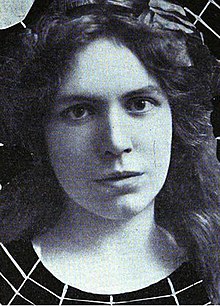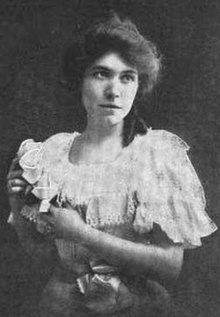Nora Dunblane (born 1879) was an American actress and short story writer.
Nora Dunblane | |
|---|---|
 Nora Dunblane, from a 1900 publication. | |
| Born | 1879 Brooklyn, New York |
| Nationality | American |
| Other names | Norah Dunblane |
| Occupation(s) | actress, romance writer |
| Years active | 1898-1915 |

Early life and education edit
Nora Dunblane was born in Brooklyn.[1] She attended Miss Rounds' School and the American Academy of Dramatic Arts (graduating in 1899), and was involved with the Brooklyn Cantata Club.[2]
After graduating, she was active in the American Academy of Dramatic Arts alumni society, and served on its library committee in 1904, with elocutionist Helena Zachos.[3]
Stage career edit
Dunblane was a "clever young American actress" on Broadway at the turn into the 20th century, often seen in soubrette roles.[4][5] Dunblane's stage credits included roles in Cyrano de Bergerac (1898) with Richard Mansfield,[6] Hearts are Trumps (1900),[7] The Cuckoo (1900),[8] Her Majesty (1900),[9] Lovers' Lane (1901),[10] Her Atonement (1899 and 1901),[11][12] The Worst Woman in London (1903),[2] Much Ado About Nothing (1903),[13] His Sister's Shame (1903),[14] and Don Carlos (1905).[15]
In 1900, she performed in an all-star benefit at Carnegie Hall, raising funds for Roman Catholic orphanages.[16]
Writing edit
Dunblane was a writer during and after her acting days. Her short fiction, often romance stories, appeared in magazines and newspapers, with titles including "The Girl in the Bookshop" (1903),[17] "Beating the Game" (1907),[18] "Studio Number Six: The Story of a Musician" (1907),[19] "Romance at Ryerson's" (1908),[20] "Two Ways of Love" (1912),[21] "Love's Command" (1913), "Otilla's Triumph" (1914),[22] "The White Gardenia" (1915), "The Girl Who Was Charming" (1915),[23] and "Jasmine's Decision" (1915).[24]
In culture edit
The band Tommy McClymont & The Panacea Jamband recorded a song, "Nora Dunblane", about the actress, on their album May the Ladies Treat You Kindly (2016). (McClymont is from Dunblane, Scotland, and was inspired to write the song by a photograph of the actress.)
References edit
- ^ "A Brooklyn Actress" The Brooklyn Daily Eagle (December 20, 1903): 31. via Newspapers.com
- ^ a b "Plays and Players" Brooklyn Life (December 26, 1903): 28. via Newspapers.com
- ^ Annual Catalogue, American Academy of Dramatic Arts and the Empire Theatre (1904): 73, 75.
- ^ "Nora Dunblane" Broadway Magazine (December 1900): 161.
- ^ "Nora Dunblane" The Judge (September 14, 1901): 4.
- ^ Paul Wilstach, "Richard Mansfield" Scribner's Magazine (November 1908): 539.
- ^ "Stage Folk" The International (April 1900): 433.
- ^ "Nora Dunblane" The New York Clipper (March 31, 1900): 4. via Illinois Digital Newspaper Collection
- ^ "A Stage Favorite" Wilkes-Barre Times Leader (October 22, 1900): 2. via Newspapers.com
- ^ "An Actress of Promise" The Tri-City Herald (December 20, 1901): 1. via Newspapers.com
- ^ "A New London Comedy" New York Times (February 12, 1899) 15. via Newspapers.com
- ^ Thomas Allston Brown, A History of the New York Stage from the First Performance in 1732 to 1901, Volume 2 (Dodd, Mead 1903): 114.
- ^ "Second Play as in Queen Elizabeth's Time" New York Times (February 3, 1903): 9. via ProQuest
- ^ "The Theatres" Philadelphia Inquirer (September 6, 1903): 28. via Newspapers.com
- ^ "At the Playhouses" Omaha Daily Bee (November 11, 1905): 6. via Newspapers.com
- ^ "Orphan Asylums' Benefit" New York Times (November 18, 1900): 22. via ProQuest
- ^ "Dramatic Notes" The Nebraska State Journal (March 22, 1903): 13. via Newspapers.com
- ^ Nora Dunblane, "Beating the Game" New-York Tribune (November 10, 1907): 32. via Newspapers.com
- ^ Nora Dunblane, "Studio Number Six: The Story of a Musician", in Alfred Ludlow White, ed., Short Stories: A Magazine of Select Fiction (November 1907): 184-192.
- ^ Nora Dunblane, "The Romance at Ryerson's" The Lafourche Comet (March 12, 1908): 3. via Newspapers.com
- ^ Nora Dunblane, "Two Ways of Love" The Buffalo Times (January 28, 1912): 64. via Newspapers.com
- ^ Nora Dunblane, "Otilla's Triumph" The Woman's Magazine (June 1914): 7.
- ^ "Literary Notes" The Wilkes-Barre Record (March 29, 1915): 14. via Newspapers.com
- ^ Nora Dunblane, "Jasmine's Decision" The Des Moines Register (September 19, 1915): 52. via Newspapers.com